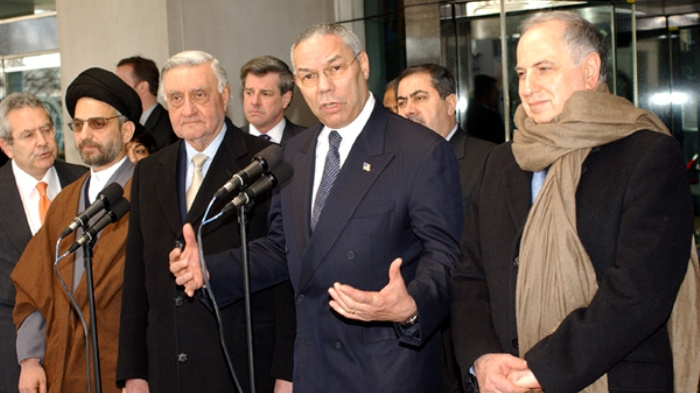Death and the Mathematician

(Ahmed Chalabi, Hoshyar Zebari, Colin Powell, Adnan Pachachi, Paul Bremer, Abdul-Aziz Hakim; powerful figures in the early years after Saddam's fall)
By: Ali Mousavi Khalkhali
Ahmed Chalabi, an iconic politician of the new Iraq and a key figure in overthrowing Iraqi dictator Saddam Hussein, passed away today. Saddam, despite several attempts to assassinate Chalabi, viewed him as a respectable figure.
Along with Iyad Allawi and Adil Abdul Mahdi, Chalabi was a veteran Iraqi opposition figure. They came from wealthy, prominent families and their fathers played prominent roles in Iraq of the royal age. Chalabi, Allawi and Abdul Mahdi studied in the same high school, but their paths diverged afterwards.
Chalabi received a Bachelor of Science degree in Mathematics from the Massachusetts Institute of Technology, and later a Ph.D. in Mathematics from the University of Chicago before departing to Lebanon to take up a position in the American University of Beirut.
The world of politics brought Chalabi, Abdul Mahdi and Allawi back together decades later. Allawi, however, did not seem to enjoy Chalabi's active role in Iraqi politics, always viewing him as a nemesis, particularly when it came to the establishment of ties with the Americans. Prior to Saddam's fall, Allawi was closer to US security services, while Chalabi enjoyed close ties with the Pentagon.
Chalabi fell out of favor with Washington soon after the fall of Saddam. Suspecting that Chalabi was playing a double game with them, the Americans made strong efforts to marginalize Chalabi in Iraqi politics. The natural result of this pressure was Chalabi's growing ties with Iran. He was frank in expressing his preference of Iranian ties to American ties. Tehran hosted him for a few months after he was charged with transferring US security intelligence to Iranians. After his return to Iraq, the veteran Iraqi politician maintained his close ties to Iran and sided with the Islamic Supreme Council of Iraq, despite his own secular approach to politics. He served in the Iraqi parliament for two terms.
Chalabi also headed the Iraqi De-Ba'athification Council, responsible for purging the state from those members of the Ba'ath party with the blood of Iraqis on their hands. He obstructed the entrance of many senior figures of the Ba'ath party into the 2nd and 3rd Iraqi parliaments.
Ahmed Chalabi was criticized for his alleged role in disbanding the Iraqi army after the fall of Saddam's regime. He strongly rejected such accusations in his interview with Al-Hayat editor-in-chief Ghassan Charbel in Charbel's book "From War to War: Saddam Was Here". Former Iraqi President Jalal Talebani and Humam Hamoudi, second in command of the Supreme Islamic Iraqi Council, supported Chalabi's defense.
Chalabi was also known as being responsible for disbanding Saddam's police and intelligence services. Chalabi did not reject these claims, however, saying that he was proud to abolish an agency that "was soaked in the Iraqi nation's blood up to its neck".
Paul Bremer, the interim governor of Iraq from May 2003 to June 2004, was particularly unsatisfied with Chalabi's role in post-Saddam Iraqi politics. In his book of memoirs in Iraq, "My Year in Iraq: The Struggle to Build a Future of Hope", Bremer remembers a "difficult" two-hour meeting in his office where Chalabi "lectured" him on all mistakes Americans had made. Bremer claims that Chalabi was "unhappy that we [Americans] were not going to simply hand over power immediately to the exiles."
Translated by: Ali Attaran

